Our Asparagus Bed
Follow our progress as we dig, plant and care for a new asparagus patch
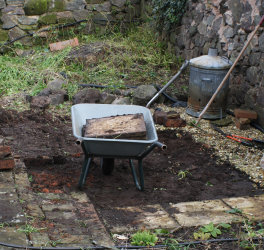 This is where we started
This is where we startedWe've wanted a new asparagus bed ever since we moved here. Sadly although our house is in a beautiful spot the soil is far from ideal for planting asparagus. However, it has moved its way to the top of our "to do" list at last and we are hoping to show that you can plant and grow asparagus in less than ideal conditions. Only time will tell.
Ideal Conditions for Asparagus Gardening
Asparagus primarily likes a light sandy soil, sunshine, and shelter from the wind along with enough rainfall or water to enable it to grow.
Choosing a Spot for the Asparagus Bed
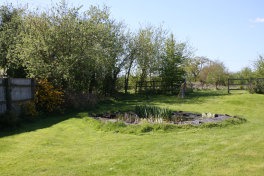 The back garden is very boggy in winter - no good for an asparagus bed
The back garden is very boggy in winter - no good for an asparagus bedThe best way to "dig" our garden is with a pickaxe! We have heavy clay mixed with lots and lots of Malvern stone (a hard granite) in all sorts of sizes. Pretty much the exact opposite of what is needed so we have had to think carefully about how we get around this.
The back garden is on a gentle undulating slope and in the winter water often sits in boggy pools in the flatter areas. Clearly this was never going to be the location. Then we have a field quite a way from the house which is at the top of the back garden. It is less boggy but quite exposed (indeed we have a beautiful view of the Malvern hills from up there). Whilst it is better drained wind protection would be an issue and we were worried that the rabbits and occasional deer might get a taste for asparagus shoots.
Finally we have a walled garden to the side of the house that we believe used to be the pig styes for the farm next door! This part of the garden has a little more soil which is pretty good quality. I can dig all of about 6 inches in this area so it is our flower garden. It is totally enclosed by Malvern stone walls and is therefore very sheltered. It showed possibilities. There was an area of rather naff cheap modern paving slabs that we've never liked. This area gets lots of sunshine and we usually cover it with containers to hide it. 3 slabs by about 8 hmmmm my eye told me that might make a raised bed. The question was could we make the soil good enough for asparagus?
Improving the Soil in our Asparagus Bed
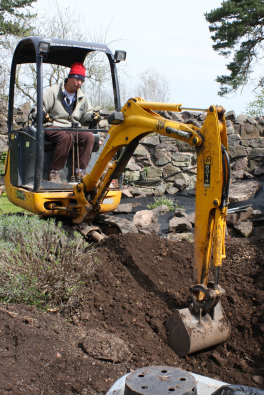 Mike became quite accomplished with the digger
Mike became quite accomplished with the diggerWe know that asparagus roots go down 1 to 2 meters so we needed to dig lots of compost into our clay to as deep a depth as possible. We also needed to keep our fingers crossed that the soil in the part of the garden was better than else where. We aimed to be able to dig down around 3 foot / 1m and then raise the bed with compost by another 18 inches / half meter. ( if we had known that we had good sandy soil we would not have felt the need to dig as deep as this).
We started by lifting the slabs, this turned out to be pretty easy and happily we found they had been laid on soil with no concrete underneath. The soil looked lovely easy to dig.... maybe we were on to a winner. We had a quick go to see how far down we could get. One spade depth easy.....Next spade depth...no way. We got the usual chink of metal on stone unmoveable stone. We acknowledged that there was no way we were going to be able to dig the depths we needed manually so we hired a small digger. We offset the cost £65 against the costs of a one or two visits to the physio to fix the bad backs we would have had wielding the pickaxe!
Of course, we didn't take our own advice (which is to prepare your asparagus bed well in advance eg in the autumn) so we had to wait impatiently waiting for the ground to be dry enough and the weather to be suitable to get digging. Finally the conditions were right and we had the digger delivered for a day in mid April.
Even the small digger we'd chosen seemed rather large in our garden but with some careful manoeuvring we got it in place and Mike quickly learnt how to drive it. I know I'm not an instinctive person so I let him get on with it. As he started to dig we realised what we would have been up against digging by hand. We pulled out huge amounts of stone (all of which we carried by hand into wheelbarrows and wheeled away). However we were also pleasantly surprised to find that we did not hit clay until about the bottom of the depth we were aiming for. The rest was quite good if slightly heavy soil.
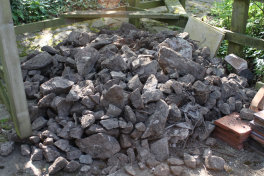 All this rock came out of the new asparagus bed
All this rock came out of the new asparagus bedWe had taken bags and bags of leaves up to the field to burn in the autumn and they were still sitting there turning into a nice leaf mould and in addition we had one and half compost heaps ready to use. We tipped leaf mould into the bottom of the bed before covering it back up and stirring it around a bit and then heaped on the compost we had set aside.
As we write this we've added all our compost and the digger has been returned but our bed is not raised.... will we have enough depth and is the soil good enough?
The Asparagus Bed Plan continued:
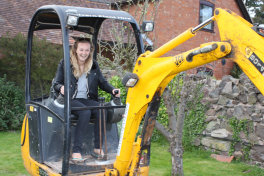 Our daughter Emma had fun trying out the digger when she got home from wqrk!
Our daughter Emma had fun trying out the digger when she got home from wqrk!Because we took so much stone out we only really maintained the level of the soil by adding compost. However, our neighbour, intrigued by what we were up to volunteered that he had two full compost heaps that we would be glad to see use.
So the plan now is to dig out his compost and bring it round to our house, build the walls for the raised asparagus bed, add some fertiliser and plant our asparagus..... and we have a short window of time to get it done.... watch out for the next instalment as we progress.
The one thing we have now been brave enough to do is get our asparagus ordered so we will be ready to go. We don't know when it will arrive so we have to get a move on to make sure the asparagus bed is ready when it arrives.
Read on to find out how we made the raised bed.....
See More Pages of Advice on Asparagus Growing
 Gus enjoying Asparagus Season
Gus enjoying Asparagus Season
The easiest way to cook Asparagus!
|
Take look at some of our Interesting and Popular Pages

 Grilled Asparagus
Grilled Asparagus Asparagus Festivals
Asparagus Festivals |
Basics of how to cook fresh asparagusstart by looking at How to Cook Asparagus first for some background information on a range of cooking methods. |
Link to us or Contact us |
Ask the Expert
We have our own Asparagus Growing Expert ready to answer any questions we can't answer so ask away. All your asparagus growing questions resolved.














